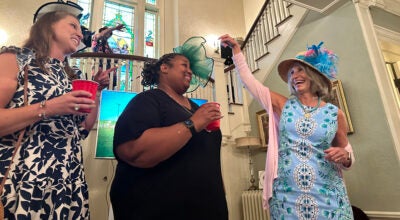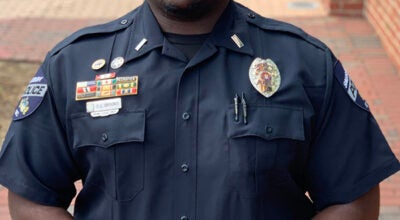Like mother, like son: Family relies on infusions to fight infection
Published 12:00 am Tuesday, December 1, 2009
By Kathy Chaffin
kchaffin@salisburypost.com
Christine Tobin was only 2 years old when she was first diagnosed with pneumonia.
Through the years, she continued to develop pneumonia, which on several occasions was severe enough to require hospitalization. Sometimes, she’d start to recover with antibiotics, then suffer a recurrence when she had finished taking them.
Christine says one of her two siblings had diabetes, so her parents had two children who were sick a lot. She continued to develop pneumonia after getting married to John Stiller and having two children.
It wasn’t until she was in her 30s that Christine started following her intuition and questioning her doctor about why she kept getting pneumonia. “I knew something was wrong with my immune system,” she says.
When her doctor referred her to an immunologist at Wake Forest University Baptist Medical Center, he diagnosed her with Common Variable Immune Deficiency (CVID). The rare disorder causes low levels of serum immunoglobulins (antibodies) and an increased susceptibility to infections.
It was about 10 years ago when Christine began receiving monthly infusions of immunoglobulin, class lgG, which is extracted from donated blood not transfused for other purposes. “The good thing about it is the blood doesn’t go to waste,” she says.
As a supervisor in the Rowan Regional Medical Center Blood Bank for 18 years, Christine said she has had donors to ask what happens to their blood if it’s not used. “I tell them no blood gets thrown away,” she says. “We’re very, very judicious about that.”
As soon as Christine started taking the infusions, her bouts with pneumonia stopped. “My health has been perfect,” she says.
After two years of infusions, she and her husband had her immunologist test their children, Jake, who was about 10 at the time, and Rachel, who was about 6.
Though Rachel’s tests were negative, the immunologist at Baptist found that Jake also suffered from Common Variable Immune Deficiency. If not diagnosed and treated, the disorder can lead to arthritis, endocrine problems such as thyroid disease and an increased risk of cancer of the lymphoid system, skin and gastrointestinal tract.
When they took Jake to Duke University Medical Center for a second opinion, an immunologist there confirmed the diagnosis.
Though he hadn’t gotten pneumonia, Jake, who is now 18, says he had a lot of strep throat and sinus problems growing up.
His parents had a hard time accepting his diagnosis, he says. Jake says he was nervous about his first infusion, “but it went really smoothly.” It took only two needle sticks to start the IV.
After about eight years, he says needles do not hurt anymore. “It’s all psychological …” he says. “It really doesn’t bother me anymore.
“It’s definitely been a good thing,” he says. Though he was a competitive gymnast before his diagnosis, Jake says he was sick a lot. “It just made it hard to train,” he says.
Once he started taking the infusions, he says he trained and competed better. Jake ó who has competed on the local, regional, state and national levels ó currently works as a coach for Advantage Gymnastics. He plans to work part time as a co-coach at G&J Speedway Gymnastics in Concord once he starts school.
Jake is also a surfer and rides BMX bikes. “Anything that has two wheels, I’ll ride it,” he says.
For both Christine and Jake, the monthly infusions of lgG immunoglobulin boosts their energy levels. “We didn’t realize how bad we felt until we started it,” she says.
When he gets an infusion, Jake says he’s tired for the rest of the day. “But the day after, I have a lot more energy,” he says. “That might be psychological, but it definitely keeps me well so I can keep doing stuff.”
Jake and his mother schedule their monthly infusions, which take about three hours, for the same time. “It’s just a good time for my mom and me to be able to sit down and talk,” he says.
When he starts classes next month at the University at North Carolina at Charlotte, Jake says he plans to continue driving to Salisbury one Friday a month for his infusion with his mother.
Both Jake and Christine are grateful to the people who donate blood. Jake, who graduated from East Rowan High School this year, says almost everyone there knew about him having to get infusions every month.
Sometimes, when they’d donate to the American Red Cross, he says, they’d say things like “I’m helping you out, Man. Some people came to me personally and said, ‘This is for you.’ It was pretty cool.”
Christine says “blood donors are really our heroes.” Giving blood “is a truly selfless thing to do,” she says, “because there’s no personal reward other than they’re helping other people.”
Blood donors are willing to donate their time and endure discomfort, she says, and they’re not getting anything back. “I think there’s a special set of wings for those people.”
Contact Kathy Chaffin at 704-797-4249.



